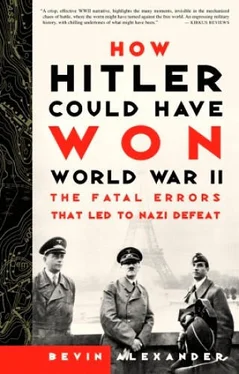American engineers frantically cut every demolition wire they could find, while a platoon of infantry raced across the bridge. As they neared the east bank, two charges went off. The bridge shook, but stood. Tanks rushed over the span, and by nightfall the Americans had a strong bridgehead on the east bank.
When Hodges called Bradley with the news, Bradley responded: “Hot dog, Courtney, this will bust him wide open!”
Bradley told Hodges to pour every man and weapon possible across the bridge and strike for the heart of Germany. But Harold R. (Pink) Bull, Eisenhower’s chief of operations, said no. “You’re not going anywhere down there at Remagen,” he announced. “You’ve got a bridge, but it’s in the wrong place. It just doesn’t fit the plan.”
The “plan”—agreed to by Eisenhower—was for Montgomery to launch his grand attack at Wesel on March 24, three weeks later.
Bradley was furious, and finally got Eisenhower to approve a strike out of the Remagen bridgehead toward Frankfurt with five divisions. Meanwhile Patton cleared the west bank of the Rhine between Coblenz and Mannheim, cutting off all German forces still to the west by March 21. The Germans lost 350,000 men, the vast bulk of them captured.
On March 22, Patton’s troops crossed the Rhine almost unopposed at Oppenheim, between Mainz and Mannheim. When the news reached Hitler, he learned that only five tank destroyers were available to contest the advance of an entire American army—and they were a hundred miles away.
The American advance east of the Rhine now became a procession. Columns spread out east, south, and north. Meanwhile Montgomery had completed his elaborate preparations. He had assembled twenty-five divisions, vast quantities of ammunition and supplies, and on the night of March 23 launched his attack after a tremendous bombardment of more than 3,000 guns, followed by waves of bombers. After daybreak two airborne divisions dropped ahead.
But there were only five weak and exhausted German divisions defending the thirty miles of the river where Montgomery crossed. They offered little resistance, and Allied losses were tiny.
Even so, Montgomery refused to sanction a general advance until he had massed twenty divisions and 1,500 tanks in the bridgehead. By this time American columns were fanning out all over central and southern Germany.
Hitler sacked Rundstedt for the last time on March 10, replacing him with Kesselring, and hunted for scapegoats for the collapse of resistance. A “Flying Special Tribunal West” tried and executed eight German officers who commanded the weak forces at Remagen. But despite these and other frantic efforts by Hitler to require every soldier to stand or die, Germans everywhere knew the end was near, and withdrew or surrendered. Only a few fanatic troops, mostly SS, resisted here and there.
Hitler now turned on his own people. On March 19 he issued an order that the entire German economy was to be destroyed—industrial plants, electric-generating plants, waterworks, gas works, bridges, ships, locomotives, food, clothing stores. His aim was to produce a “desert” in the Allies’ path.
Albert Speer, Nazi armaments chief, immediately petitioned Hitler. “We have no right at this stage of the war to carry out demolitions which might affect the life of the people,” he said. But Hitler, his own fate sealed, was not interested in the continued existence of the German people.
“If the war is lost,” he told Speer, “the nation will also perish…. It will be better to destroy these things ourselves because this nation will have proved to be the weaker one.”
The scales fell from the eyes of Speer. With superhuman efforts, Speer and a number of army officers, directly disobeying Hitler’s orders at last, raced about the country to make sure the demolitions did not take place.
The end was now approaching. Montgomery’s British and Canadian armies pushed north toward Bremen, Hamburg, and Lübeck on the Baltic. Simpson’s U.S. 9th Army rushed past the Ruhr on the north while Hodges’s 1st Army drove past it on the south. They linked up April 1 at Lippstadt, closing 325,000 Germans of Walther Model’s Army Group B in the Ruhr pocket. The army group held out till April 18, when it surrendered. Model was not among the prisoners: he had shot himself.
During this period Hitler more and more lost contact with what was happening. While the western Allies were sweeping almost unopposed over Germany, Hitler focused his attention on recapturing the fortress of Küstrin on the Oder, complaining that the attacking general had not used enough ammunition in the artillery preparation. When Guderian angrily pointed out on March 28 that there was no more ammunition, Hitler relieved him, appointing Hans Krebs as chief of staff.
On April 12, President Roosevelt died unexpectedly, arousing wild hopes in Hitler that a miracle like that which saved Frederick the Great from defeat in the Seven Years War would be repeated. The death of the empress of Russia ended the coalition against Frederick.
The day before FDR died, the spearhead of 9th Army reached the Elbe River near Magdeburg in the heart of Germany. Berlin was only sixty miles away, and the road lay open.
Over the violent objections of Churchill and the British military chiefs, who wanted to beat the Russians to Berlin, Eisenhower halted the western Allies on the Elbe.
Berlin “was not the logical or the most desirable objective for the forces of the western Allies,” Eisenhower wrote.
The Russians commenced their drive from the Oder shortly after the Americans reached the Elbe. This meant, to Eisenhower, that they would reach Berlin before the British and Americans could do so. Eisenhower and his staff were obsessed with Nazi reports that they would establish a “National Redoubt” in the mountains of southern Germany and conduct guerrilla warfare for years. Eisenhower also feared the Nazis were setting up an “underground army” of “Werewolves,” composed of loyal followers of Hitler, to commit murder and carry out acts of terrorism.
The National Redoubt and the Werewolves existed only in the propaganda blasts of Joseph Goebbels. But Eisenhower and his staff fell for the ploy, and he directed the American armies into the southern mountains as fast as possible. American troops reached Nuremberg on April 16, Munich on April 30, and met troops of the U.S. 5th Army from Italy at the Brenner Pass between Austria and Italy on May 3. German resistance had collapsed in Italy and commanders had signed a surrender on April 29.
The Russians burst out of their bridgeheads on the Oder on April 16, and reached the suburbs of Berlin a week later. While several hundred thousand Soviet troops invested the city, others swept around it north and south, and on April 25 patrols of the 58th Guards Division met patrols of the U.S. 69th Division on the Elbe at Torgau, seventy-five miles southwest of Berlin. Adolf Hitler was cut off in Berlin. The death throes of the Third Reich had come.
Hitler had planned to leave Berlin on April 20, his fifty-sixth birthday, for Obersalzberg in the Bavarian Alps. Most officials had already moved south, along with the Fuehrer’s personal staff. But Hitler stayed, convinced that the Russians would suffer their greatest defeat trying to capture the German capital. But Himmler, Göring, and Ribbentrop got out. Hitler called for a counterattack that never came—and in fact existed only in the mind of the dictator. Hitler had fallen into a world of delusion.
On April 22, Jodl and Keitel reported that the Russians had broken through on the north and their tanks were now inside the city limits. Hitler completely lost control. This was the end, he shrieked. There was nothing but treason, lies, cowardice! All was over. He would stay in Berlin, and personally take over defense of the city.
Читать дальше


![Джонатан Димблби - Barbarossa - How Hitler Lost the War [calibre]](/books/385421/dzhonatan-dimblbi-barbarossa-how-hitler-lost-the-w-thumb.webp)









